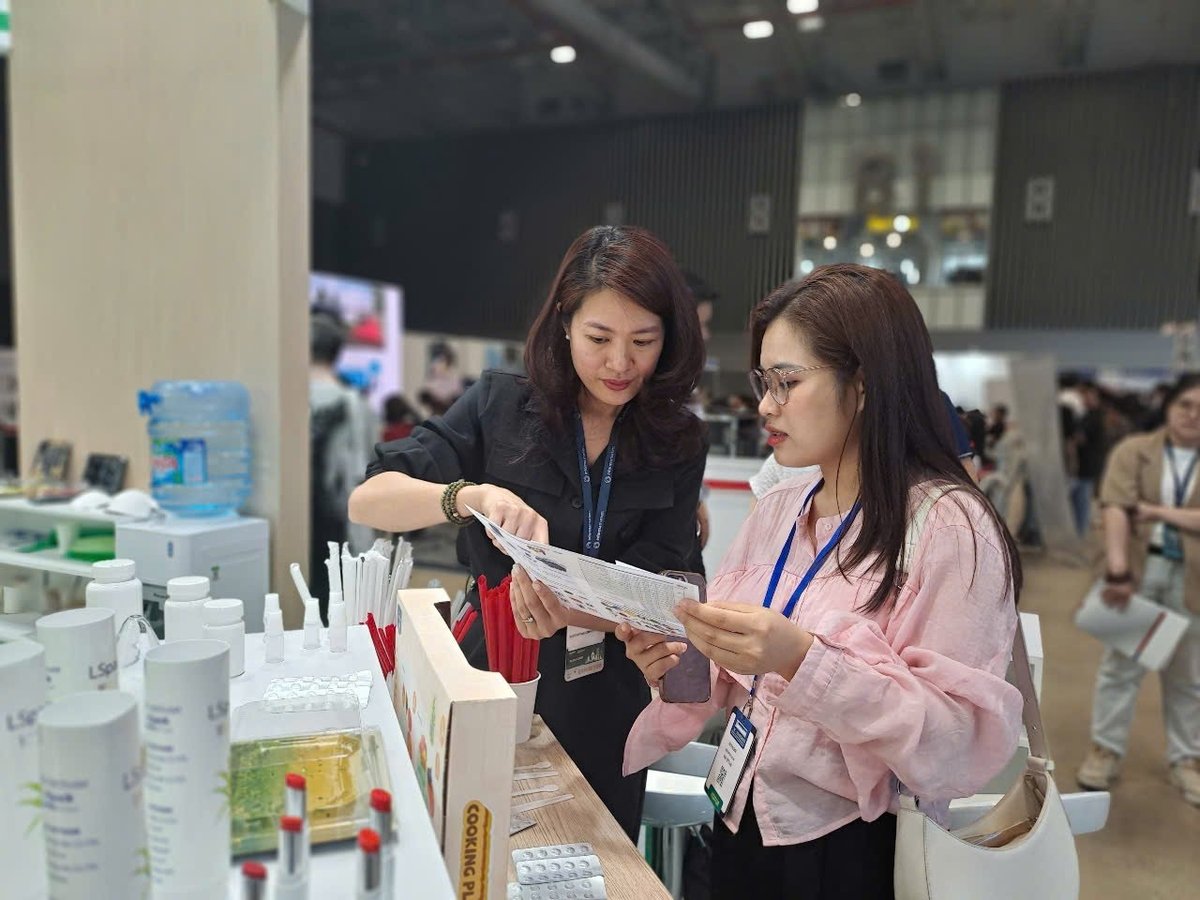November 28, 2025 | 01:58 GMT +7
November 28, 2025 | 01:58 GMT +7
Hotline: 0913.378.918
November 28, 2025 | 01:58 GMT +7
Hotline: 0913.378.918
This is the content presented at the Workshop "Greening the Rubber - Plastic Industry Journey" organized by the Vietnam Waste Recycling Association on March 18 in Ho Chi Minh City.
According to Mr. Tran Viet Anh, Chairman of the Vietnam Waste Recycling Association, the Vietnamese rubber and plastic industry has grown impressively in recent years, making an essential contribution to the national economy.
According to statistics, the Vietnamese plastic industry has a revenue of about USD 25 billion per year, with an average growth rate of 10-12%. The rubber industry is equally important, with exports reaching USD 3.5 billion per year, contributing to making Vietnam one of the leading rubber exporting countries in the world.

Consumers are increasingly interested in recycled products. Photo: Ha Duyen.
In addition to intense development, the rubber-plastic industry faces significant environmental challenges. The increasing consumption of plastics has led to the problem of plastic waste and the need for sustainable recycling.
According to Mr. Tran Viet Anh, currently in Vietnam, implementing systematic waste recycling is still very rudimentary. Typically, in the current plastics industry, only two businesses recycle according to US standards; the rest recycle products that do not meet standards and quality.
"According to world standards, recycled products must have a quality equal to 90% of virgin products. Therefore, we have not yet achieved this", Viet Anh emphasized and added that one of the critical issues the Vietnam Waste Recycling Association closely follows is the extended producer responsibility (EPR). This mechanism forces businesses to take responsibility for the life cycle of their products, from production to recovery and recycling. "Good implementation of EPR will help the rubber and plastic industry minimize environmental impacts while opening up many opportunities for the recycling sector to develop more strongly," Tran Viet Anh affirmed.
Sharing the same view, Nguyen Thi - University of Natural Resources and Environment, said plastic production is growing rapidly. In the world, if in 1950 only 2 million tons of plastic were produced, by 2019, this number had increased to 400 million tons, an increase of 200 times. Meanwhile, the amount of recycled plastic only accounts for 9%.
In Vietnam, plastic production increased rapidly from 0.2 million tons in 1990 to more than 10 million tons in 2022. By 2025, plastic production in Vietnam is expected to reach 11.65 million tons.
According to Thi, recycling activities are carried out relatively well in factories, but recycling still faces many challenges for household waste.
In big cities like Hanoi and Ho Chi Minh City alone, up to 80 tons of plastic waste and nylon bags are released into the environment every day. However, the current recycling rate is still very low, only about 10%, while most of the remaining plastic waste is treated by landfill or incineration.
Explaining the reasons for this situation, Thi said that recycling household waste requires a large area. The recycling process will continue to have waste. Therefore, it is necessary to have advanced technology and large capital. Along with that is the determination of the recyclers.
Giving suggestions on solutions to promote waste recycling in the rubber-plastic industry, Dr. Pham Viet Anh - PhD in Sustainable Business Administration, PhD in Sustainable Development and Diplomacy, said that the Government needs to have policies to support businesses, even develop clusters related to the recycling industry.
The Government needs to introduce stimulating policies, for example, burning waste to generate electricity, then that electricity will be purchased at a higher price to attract businesses to invest. These are also the programs that developed countries are doing to promote recycling. Therefore, the policy on EPR (Extended Producer Responsibility for Compliance with Product and Packaging Recycling Regulations) was born at this time very timely. It means that recyclers will be rewarded with money from the recycled products.
“In the past, we mainly invested in business administration, banking and finance, but it seems that the engineering and technology industries have not been very interested. Therefore, from the school side, there needs to be an investment orientation to be proactive in technology and proactive in people”, Dr. Pham Viet Anh emphasized.
EPR is a great opportunity for the Vietnamese recycling industry, creating financial resources to promote recycling. Especially for export products, using recycled materials at a specific rate, meeting standards like a “green card” to enter demanding markets…
Translated by Huong Giang

(VAN) On November 27, in the meeting with Minister Tran Duc Thang, Mayor Yin Yong shared Beijing’s experience to improve environment and air quality.

(VAN) After 30 years, both sides identified strategic areas of cooperation: sustainable production, increasing coffee value and training for farmers.
/2025/11/27/4910-4-164708_294.jpg)
(VAN) On the afternoon of November 27 in Beijing, Minister of Agriculture and Environment Tran Duc Thang held a working session with several major Chinese enterprises operating in the agriculture and environment sector.

(VAN) The Department of Animal Health issued a provisional guideline requesting local authorities to increase surveillance, collect samples for testing, and conduct epidemiological investigations according to the established procedure.

(VAN) The United Nations recommends that Vietnam utilize data and artificial intelligence to enhance early disaster warnings and reduce GDP losses by 3.2% in the context of climate change.

(VAN) On the morning of November 27 in Beijing, Minister Tran Duc Thang and the Deputy Commissioner General of the General Administration of Customs of China signed a protocol on fresh jackfruit exports.

(VAN) As floodwaters recede, a vast network of irrigation works across eastern Gia Lai is emerging in a state of severe disrepair, with extensive damage demanding urgent restoration ahead of the 2025-2026 winter-spring cropping season.